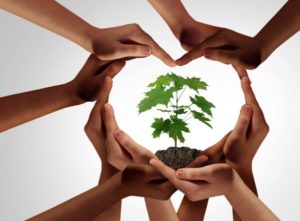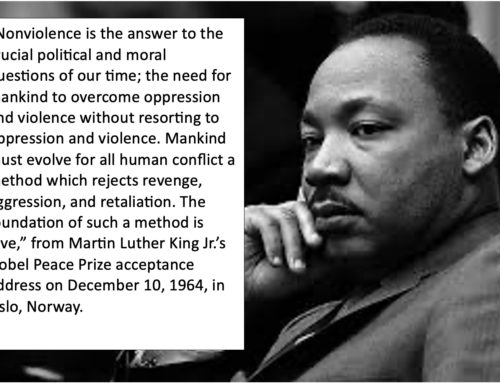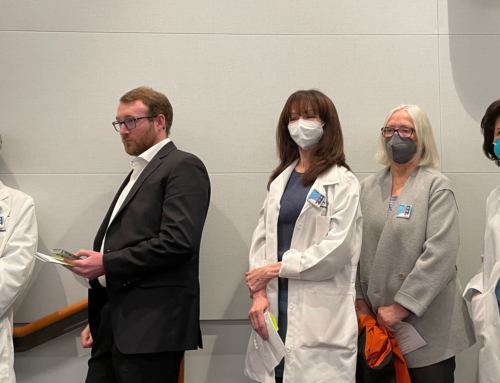
MAY 4, 2020
View original newsletter email
SUPPORTING HEALTH-CARE PROFESSIONALS
Our hearts and thoughts are with all of the health-care professionals working on the frontlines of this epidemic and courageously taking care of patients. Along with you, we are advocating for all health-care workers to receive the personal protection equipment they require, for the launch of comprehensive testing regimes, and for universal access to medical treatment.
Like you, we were troubled by recent reports that suggest the rate of infections and deaths among health-care workers may be higher than the CDC is reporting. It turns out that the antiquated reporting systems used by many states and the CDC don’t allow for nationwide tracking of infections and deaths among health-care workers. On April 8, California released new data detailing COVID-19 illnesses and deaths within racial and health-care worker demographics. While the California Department of Public Health’s efforts in this area are commendable, questions about undercounting persist.
Also, you may have read that the Center for Disease Control (CDC) announced guidance allowing employers to keep people at work even after they have been exposed to COVID-19. SF Bay PSR opposed this politically driven guidance which is a reversal of the CDC’s policy for the general public and contrary to what we know about the epidemiology of the virus. We supported the statement issued by the National Council for Occupational Safety and Health (COSH) and the Protecting Workers Alliance demanding that the CDC retract the guidance and instead provide workers with protection.
Please know that the board, staff, and members of SF Bay PSR stand with the dedicated health-care professionals fighting against COVID-19. For those not directly involved on the frontlines of this epidemic, here are some actions you can take:
SIGN the Physicians for Human Rights letter demanding protective gear for COVID-19 first responders. Also, sign this letter by the Union of Concerned Scientists, labor unions and environmental partners, asking the federal administration to use the Defense Production Act to quickly manufacture and quickly distribute personal protective equipment.
CONTRIBUTE YOUR STORIES to “Lost on the Frontline,” an online memorial launched by the Guardian and Kaiser Family Foundation’s Kaiser Health News to honor and memorialize all of the frontline health-care workers who have died because of COVID-19.
VIEW the National Academy of Medicine offers Resources to Support the Health and Well-Being of Clinicians During COVID-19

REMEMBERING DR. JEFF GEE
Dr. Jeff Gee was a friend, a PSR supporter, and an especially sweet man whom we will all miss dearly. Jeff did not die of COVID-19. He had just come out of a battle with cancer and was relocating his practice to Santa Rosa to serve very poor and underserved communities. On the way to work, he was killed by a drunk driver who ran a red light when Jeff was making a turn. PNHP California Chair Dr. Hank Abrons and many of us at SF Bay PSR have worked closely with Jeff over the last decade to join ranks, often coordinating our white coat contingents/banners for marches and rallies spanning our priority issues.
Although it is unusual for us to direct our supporters “elsewhere” in our movement, out of friendship and solidarity, we would like to ask you to please consider giving in Jeff’s memory to the Physicians for a National Health Program and note that the donation is in memorial of Dr. Jeff Gee.

SPOTLIGHTING SF BAY PSR’S COMMITTEES
Please join us in welcoming our new board members—
Jan Kirsch, Michael Martin, and Sarah Schear!
All PSR members are invited to join our committees. We are looking for new members. The Environmental Health Committee will meet next on Wednesday, May 20, at 7pm, via Zoom. Please contact info@sfbpsr.org for more details, including the Zoom link. SF Bay PSR wishes to express its deep gratitude to Dr. Tom Newman who has chaired the Environmental Health Committee since its inception and will be stepping down after the May Meeting.
We’re also delighted to announce that Patrice Sutton, MPH has agreed to take on the leadership responsibilities for this committee for the next year. Patrice is a research scientist and currently a collaborator with UCSF’s Program on Reproductive Health and the Environment. Patrice has more than 30 years of experience in occupational and environmental health research, industrial hygiene, public health practice, policy development and community-based advocacy, including work on behalf of communities impacted by nuclear weapons research, development, testing, and production.
Building on the strong track record of the Environmental Health Committee, SF Bay PSR will launch a second advisory committee by early fall. The Nuclear Abolition Committee is expected to bring additional focus and attention to SF Bay PSR’s opposition to the upgrading of nuclear arsenals in the U.S. and around the world, as well as efforts to dismantle current, aging nuclear stockpiles. Tova Fuller, MD, PhD was recently elected as the chair of this new committee and in this capacity will be working closely with PSR’s President Bob Gould and other interested members. Tova is a psychiatrist at UCSF who has been engaged with PSR since she was a medical student. She has served on the national, Los Angeles, and Washington PSR boards of directors and as a member of nuclear taskforces in Los Angeles and Seattle. She feels strongly about militarism in general and published with war epidemiologist Les Roberts on Iraqi mortality during the Iraq War.

COVID-19: REFRAMING THE CLIMATE EMERGENCY
While the Climate Crisis has been eclipsed recently by the COVID-19 pandemic, many advocates argue that it is a mistake to see them as separate and distinct occurrences. We took a close look at a recent article by Arthur Wyns, a World Health Organization climate change researcher who wrote “Climate Change and Infectious Diseases,” in Scientific American. Wyns explains that while direct links between climate change and COVID-19 are still being uncovered, the two health emergencies are connected by their devastating impact on poor and marginalized communities and the need for what Wyns calls “global-to-local” responses and long-term strategies to overcome these long-lasting “health shocks.”
Marginalized people, including significant portions of communities of color, are more at risk to disease exposure not only because they tend to work in jobs that place them on the frontlines of epidemics, but also because food insecurity, social and economic inequities, inadequate health care, air, land, and water pollution, and other factors undermine their ability to survive major health shocks. Indeed, Wyns argues that long-lasting health emergencies such as those represented by COVID-19 and the Climate Crisis act as “poverty multipliers,” because vulnerable individuals and families are forced to shift their meager resources to cope with the additional threats to their health and well-being.
We can distill four lessons, according to Wyns, from the fight against COVID-19 to the Climate Crisis:
- Well-resourced, equitable health systems with a strong and supported health workforce are essential to protect us from health security threats, including climate change.
- Creating healthy environments for healthier populations and promoting universal health coverage are two of the most effective ways in which we can reduce the long-term health impacts from both the coronavirus pandemic and climate change.
- Both types of health emergencies require long-term shifts in old behaviors and assumptions, which could lead to a public drive for collective action and effective risk management.
- Crises such as COVID-19 and the Climate Crisis offer an opportunity for a regained sense of shared humanity, in which people realize what matters most: the health and safety of their loved ones, and by extension, the health and safety of their community.
Our society is at a pivotal moment.
The COVID-19 pandemic is showing Americans that listening to science, taking action early, and working collectively, along with the new found political will to fund public programs, make it possible for us to tackle problems such as pandemics and climate change.
A recent survey reveals that U.S. registered voters (N=3,933; including 3,188 registered voters) across a full spectrum of demographics (including those who have been laid off or are seeking work, Republicans, Democrats, Independents, and 2016 Trump voters) prioritize protecting public health over the economy by a margin of more than 5-to-1.
In January 2020, Assembly member Rob Bonta (D-Oakland) introduced the California Green New Deal, AB 1839, which affirms universal human rights for all CA residents and creates the CA Green New Deal Council. This Council would be required to prepare policy recommendations to the CA Legislature related to the creation of green jobs, overcoming systemic racism, the reduction of climate change impacts, and the continued protection of public health and the environment. As envisioned by the legislation, the state of CA would also undergo a mandated reduction in its reliance on fossil fuels.
Unemployment claims surpassed 22 million in just four weeks. Governor Gavin Newsom announced an economic recovery task force helmed by former presidential candidate Tom Steyer, who continuously brought the election conversation back to climate change and founded the Community Development Bank of Oakland, CA, to focus on serving people who have been locked out of the traditional financial systems.
This is our chance to push for a Green New Deal. Economic recovery from COVID-19 is an opportunity for us to create an economy that simultaneously tackles climate change and creates more social and health equality.
PSR members, this is the moment to send letters, write op-eds, and sign letters supporting a Green New Deal for California.

Readings & Resources
- In case you missed our Earth Day email, here are the Earth Day messages from Medical Students for a Sustainable Future. Please click here to watch.
- Harvard C-Change: A Conversation on COVID-19 with Dr. Aaron Bernstein, Director of Harvard C-CHANGE
- World Health Council: Climate change and human health – risks and responses. Summary.
- Stanford Earth: How does climate change affect disease?
- Guardian: Toxic chemicals in our homes could increase Covid-19 threat
- Earth Institute:
The Importance of Building Coalitions for a Clean Energy Recovery From COVID-19
How Climate Change Is Exacerbating the Spread of Disease - Scientific American: What Could Warming Mean for Pathogens like Coronavirus?
- New York Times:Black Americans Face Alarming Rates of Coronavirus Infection in Some States
New Research Links Air Pollution to Higher Corona Virus Deaths
Opinion—Amid the Corona Virus, America Needs a More Just Society
E.P.A., Citing Coronavirus, Drastically Relaxes Rules for Polluters - New Yorker: Also, we encourage you to sign up for Bill McKibben’s new column in the New Yorker magazine on climate change: How We Can Build a Hardier World After the Coronavirus
What the Corona Virus Reveals About American Medicine - Wired: Mary Annaïse Heglar, writer-in-residence at Columbia University’s Earth Institute in partnership with the Natural Resources Defense Council: We Can’t Tackle Climate Change Without You
- Ecohealth Knowledge to Action Research Group from Canada is hosting a webinar series on planetary health






